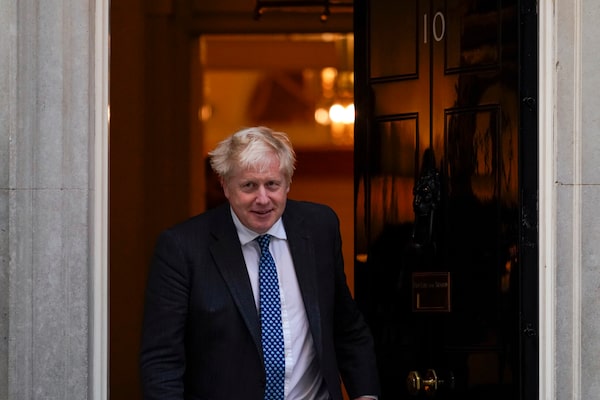
Britain's Prime Minister Boris Johnson steps out from 10 Downing Street in London on Sept. 17.Alberto Pezzali/The Associated Press
Britain is easing many international travel restrictions, including testing requirements and quarantine rules, but only for fully vaccinated travellers from the U.K. and a select list of countries that includes Canada.
As of Oct. 4, all British travellers who’ve had two doses of vaccine will no longer need a COVID-19 test before they return to England. They will still have to take a PCR test on the second day of their arrival, but at the end of October that will be replaced by a less expensive lateral-flow test. Anyone who tests positive will need to self-isolate and take a second PCR test.
Britain will also accept travellers from Canada and 16 other countries as fully vaccinated if they’ve received two doses of the Oxford-AstraZeneca, Pfizer BioNTech, Moderna or Janssen vaccines. Canadians also won’t have to take a pre-departure test, but they will have to follow the same testing requirements as British travellers after their arrival. Until now, only travellers from the U.S. and the European Union could be recognized as fully vaccinated.
The U.K. government is also dropping its “traffic light” system, which ranked countries according to their level of disease. Instead, as of next week the government will only keep a list of 54 “red list” countries, including Brazil, Mexico and South Africa. Only British travellers can enter the U.K. from nations on the red list, and they must still quarantine for 11 nights in a hotel at a cost of £2,285 ($4,000).
All of the changes apply only to England for now, but Scotland, Wales and Northern Ireland, which manage their own health care systems, are expected to follow suit.
“The purpose is to make it easier for people to travel without the bureaucracy, without so many tests, and with a greater level of certainty, now that we’ve got so many people vaccinated,” Transport Secretary Grant Shapps said Friday. “It does give us some additional freedoms that we didn’t really have before.”
The announcement is the latest signal that the government plans to rely heavily on vaccines to manage the pandemic. Earlier this week, Prime Minister Boris Johnson ditched plans to introduce mandatory vaccine passports and tighten face mask rules in England this winter. Instead, Mr. Johnson launched a national booster shot program for people over the age of 50 and expanded the immunization drive to all teenagers. “We are confident in the vaccines that have made such a difference to our lives and we’re now intensifying that effort,” he said.
Mr. Johnson argued that mandatory vaccine passports for restaurants and entertainment venues weren’t necessary, at least for now. He said that could change if cases rose sharply or hospitals became overwhelmed. The Welsh and Scottish governments have introduced vaccine passports for nightclubs and large gatherings such as soccer matches.
In a further effort to increase vaccination rates, Mr. Shapps said none of the travel changes announced on Friday would apply to unvaccinated people. They will still be required to have PCR tests before and after arrival, and they will have to self-isolate for 10 days upon arrival in England.
Like many countries, Britain has been confronting a wave of COVID-19 cases driven by the Delta variant. However, the number of new cases has stabilized in recent weeks at around 30,000 a day. Hospitalizations and deaths have been rising slightly but both remain far below levels reached at the height of the pandemic last January.
Airlines and travel operators welcomed the changes but called on the government to go further and scrap the testing regime altogether for fully vaccinated passengers. Vaccinated travellers “and those from low-risk countries will still have to do an unnecessary test after arriving in the U.K., making travel less affordable for all,” said Johan Lundgren, the chief executive officer of EasyJet. “Since July 1 there has been no testing at all for vaccinated travellers within the rest of Europe, and this is why the U.K. will continue to fall further behind the rest of Europe if this remains.”
Some health experts have raised concerns that easing testing for arriving passengers could weaken Britain’s ability to monitor new variants of the virus. Britain has been a world leader in tracking genetic sequencing of the virus and identifying new mutations. Only PCR tests are examined for genomic sequencing.
The changes “kind of makes sense if you look at the rates of COVID in the U.K. right now. They’re high, so probably lateral flow tests will be sufficient for travellers,” said Allan McNally a professor of microbial evolutionary genomics at the University of Birmingham. However, Dr. McNally told the BBC that the government had to ensure that anyone who tested positive from a lateral flow test was also given a follow-up PCR test so that the sample could be genetically sequenced.
“We learned from Delta, if we’re not monitoring travel-related COVID cases we can wind up in big trouble,” he said.
Sign up for the Coronavirus Update newsletter to read the day’s essential coronavirus news, features and explainers written by Globe reporters and editors.